 Petzlover
Petzlover Both English Mastiff and Parson Russell Terrier are originated from United Kingdom. English Mastiff may grow 40 cm / 16 inches higher than Parson Russell Terrier. English Mastiff may weigh 105 kg / 232 pounds more than Parson Russell Terrier. English Mastiff may live 3 years less than Parson Russell Terrier. Both English Mastiff and Parson Russell Terrier has almost same litter size. English Mastiff requires Low Maintenance. But Parson Russell Terrier requires Moderate Maintenance
Both English Mastiff and Parson Russell Terrier are originated from United Kingdom. English Mastiff may grow 40 cm / 16 inches higher than Parson Russell Terrier. English Mastiff may weigh 105 kg / 232 pounds more than Parson Russell Terrier. English Mastiff may live 3 years less than Parson Russell Terrier. Both English Mastiff and Parson Russell Terrier has almost same litter size. English Mastiff requires Low Maintenance. But Parson Russell Terrier requires Moderate Maintenance
 Throughout most of history there have been images created by people of very large, sturdy dogs that they shared their space with. The English Mastiff can trace some part of her ancestry to these same dogs. This breed is thought to have come from the stock of ancient breeds such as the Alpine Mastiff, Pugnaces Britanniae and Alaunt. The Mastiff in general has then become a main descendent of many other breeds of dogs since the 1880’s. The images of these types of dogs goes back to the 5th and 6th century.
Throughout most of history there have been images created by people of very large, sturdy dogs that they shared their space with. The English Mastiff can trace some part of her ancestry to these same dogs. This breed is thought to have come from the stock of ancient breeds such as the Alpine Mastiff, Pugnaces Britanniae and Alaunt. The Mastiff in general has then become a main descendent of many other breeds of dogs since the 1880’s. The images of these types of dogs goes back to the 5th and 6th century.
There is no genetic evidence linking these dogs to the modern Mastiffs and the English Mastiff, but the resemblance is obvious. There is anecdotal evidence that these Mastiff type dogs were exported from England – the English Mastiff – to Greece to hunt game but were also used as war dogs by the Celts. The Alaunt was probably used the Normans and bred by the Alans. Writings and images throughout these times depicted a dog that looked very much like today’s English Mastiff. Some speculate that the English Mastiff came to the United States of the Mayflower.
There was a decline in the English Mastiff in its homeland in the 1800’s following the Cruelty to Animals Act of 1835 which prohibited owners and trainers from baiting animals. Then in the 19th century, prior to the first World War, systematic breeding programs began with J.W. Thompson. His first English Mastiff was a female named Dorah. Dorah’s ancestors included dogs from Thompson’s Grandfather. Captain John Garnier of the Royal Engineers also had dogs that contributed to the development of the English Mastiff.
During this time some breeders got away from pure type and began to breed for other factors. In the late 1800’s, Edgar Hanbury and Mark Hanbury Beaufoy began restoring the breed to its original soundness. One of their dogs was exported to the US were breeding to soundness continued until the First World War reduced the number of English Mastiffs around the world. By the time the war ended there were no English Mastiffs outside of England.
There was a dog in Canada named Beowulf and direct descendent of imports from Britain, who came to the States after the war and began to re-establish the breed on this continent and registered with the American Kennel Club. Yet as of 1945, the contribution from North
Breeding was stopped again for World War II and started again after the war. Many of these puppies died of distemper. Only one female had pups that were able to grow up into adults. North America sent dogs to England at this time and all of the Mastiffs from that time, could be traced back to Nydia and the 14 North American Mastiffs. Since then the breed has been restored slowly in Europe, North America and everywhere in the world.
The English Mastiff is known by his massive head with a black mask and comes in a wide variety of colors. He is also known as a gentle giant because of his personality and the love he has for his people.
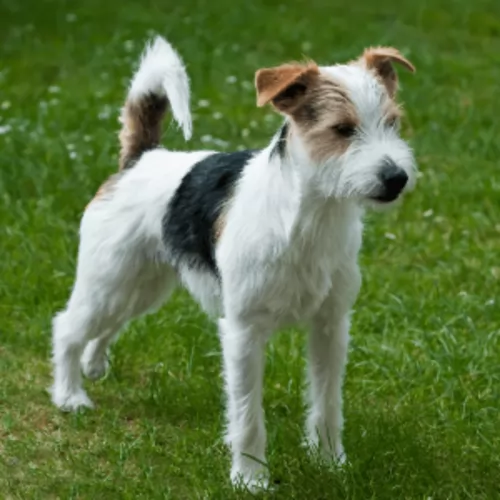 The Parson Russell Terrier hails from England and is a small to medium sized dog dating back to the 18th century. It is believed that Reverend John ‘Jack’ Russell was the developer of this dog. The Parson has always been involved with England’s sport of foxhunting.
The Parson Russell Terrier hails from England and is a small to medium sized dog dating back to the 18th century. It is believed that Reverend John ‘Jack’ Russell was the developer of this dog. The Parson has always been involved with England’s sport of foxhunting.
They’re spritely and quick and have been able to keep up on a hunt and take on a fox in its lair. The dog was first recognized in 1990 in the United Kingdom as the Parson Jack Russell Terrier and in America in 1997.
All the top kennel clubs recognize this dog as the Parson Jack Russell Terrier.
 The English Mastiff is a giant dog with a broad head and body. In terms of mass it is the worlds largest dog, just a little bigger that the Saint Bernard. The Great Dane and the Irish Wolfhound are 6 inches taller but do not carry the weight and bulk of the Mastiff. Mostly square in his body and his head with a massive chest and wide set forelegs. The head is square and very large. No matter the color of the coat, the face should have a black mask like the St. Bernard. His eyes and nose are also dark.
The English Mastiff is a giant dog with a broad head and body. In terms of mass it is the worlds largest dog, just a little bigger that the Saint Bernard. The Great Dane and the Irish Wolfhound are 6 inches taller but do not carry the weight and bulk of the Mastiff. Mostly square in his body and his head with a massive chest and wide set forelegs. The head is square and very large. No matter the color of the coat, the face should have a black mask like the St. Bernard. His eyes and nose are also dark.
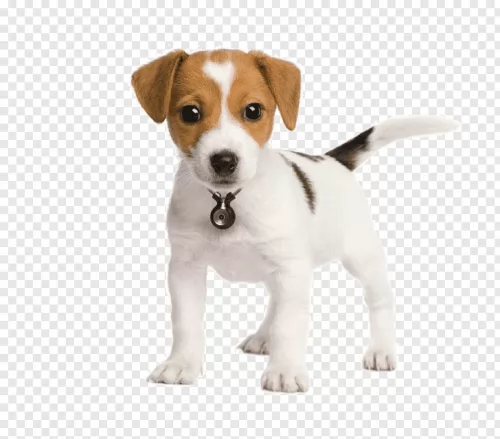 The Parson Jack Russell is essentially a white dog with black and tan or orange-fawn patches. He can be tri-colored too. The coat is either smooth, rough or broken.
The Parson Jack Russell is essentially a white dog with black and tan or orange-fawn patches. He can be tri-colored too. The coat is either smooth, rough or broken.
He stands at between 33–36cm tall at the withers and weighs between 5 and 8kg. Unlike the Jack Russell, the Parson Russell Terrier has longer legs. He has some longer hair on the head, legs and body. The ears are floppy wit the tip pointed forward. The tail has always been docked but when left long it it held high, slightly curving over the back.
Feisty, brave, cheeky and alert, the Parson Russell Terrier is an energetic dog who gets on well with children as he knows that this is essentially where his games come from.
He is bold and clever and you’ll be able to have him trained and socialized without any trouble. These little dogs are full of life and they are protective of their humans and their property, making excellent watchdogs.
 The English Mastiff is very happy to play with children. You willl need to be careful with small children as he does not know his size and is likely to sit on them.
The English Mastiff is very happy to play with children. You willl need to be careful with small children as he does not know his size and is likely to sit on them.
This lovable giant is noble and loyal. He will protect his family and he will be courageous about it.
This is a big dog but he doesnt live outside. You need a big yard and perhaps a big house. He may not adapt to an apartment.
The English Mastiff is smart and certainly trainable. He can be independent and stubborn at times but he has the ability to learn.
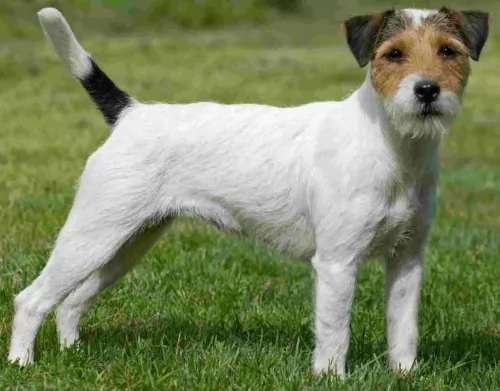 In general the Parson is a friendly,loving dog, fairly small but packed full of feisty personality.
In general the Parson is a friendly,loving dog, fairly small but packed full of feisty personality.
They make excellent pets for the entire family. He is an intelligent dog, but typical of most terriers he can be stubborn, but this can easily be fixed with training and socialization. With good care, he’ll make you a wonderful little pet and companion.
 Being a massive dog can take its toll on the body’s development and that is certainly true of the English Mastiff. A lot of running is not recommended in the early life of the dog – preferable for the first two years. This could damage the joint’s growth plates and cause him a lot of problems in later years. Too much exercise in this massive dog can hurt him but so can, not enough exercise.
Being a massive dog can take its toll on the body’s development and that is certainly true of the English Mastiff. A lot of running is not recommended in the early life of the dog – preferable for the first two years. This could damage the joint’s growth plates and cause him a lot of problems in later years. Too much exercise in this massive dog can hurt him but so can, not enough exercise.
Some of the health issues other than this that the English Mastiff is prone to include:
A large dog like the English Mastiff is always prone to pain from arthritic joints. See your vet about pain medication.
A spot under the skin that is swollen and filled with fluid. Can be treated. It is not an infection or contagious.
Can result in lameness and arthritis.
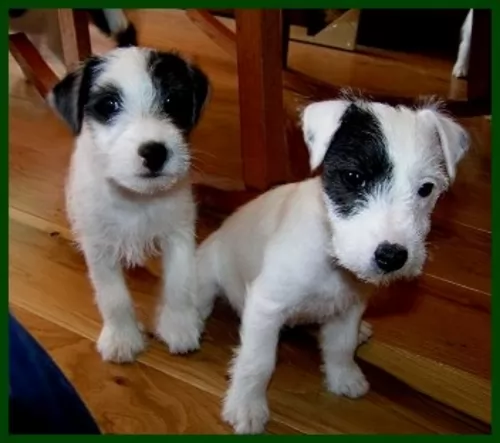 Your Parson Jack Russell can live to be between 12 and 15 years but nonetheless he does have some breed-related health issues to watch for.
Your Parson Jack Russell can live to be between 12 and 15 years but nonetheless he does have some breed-related health issues to watch for.
Eye conditions which can affect this dog include primary lens luxation,cataracts, corneal dystrophy and progressive retinal atrophy. With cataracts the lens of the eye develops a cloudy look resulting in poorer vision and sometimes blindness. Cataract surgery is available for dogs.
Your Parson Jack Russel should be lean and muscular and always full of energy. Avoid feeding him unhealthy treats which can lead to obesity and other health problems.
All kinds of parasites such as ticks, fleas and worms can invade your dog’s body. Roundworms, hookworms and tapeworms can cause havoc with their health and some of these parasites can even be transmitted to humans. It’s why it is important to get your puppy to the vet to be de-wormed and to get his first injections.
A liver disorder known as portosystemic shunt can mean that some of the blood supply doesn’t get to the liver and it doesn’t function properly. This will mean the liver can’t remove toxins from the bloodstream effectively.
 This is an enormous dog that grows quickly. It is important to feed them properly as they grow. If he doesn’t get what he needs as a puppy you will not be able to make it up to him later on.
This is an enormous dog that grows quickly. It is important to feed them properly as they grow. If he doesn’t get what he needs as a puppy you will not be able to make it up to him later on.
The English Mastiff puppy needs good nutrition for growing properly.
From 12-16 weeks of age feed him 3-4 cups a day of a high protein, high quality dry food. Break this up into 3-4 meals.
From 4 -6 months of age feed him 8-10 cups a day of a high protein, high quality dry food. Break this up into 2-3 meals.
From 6-18 months of age feed him 8-12 cups a day of a high protein, high quality, dry food. Break this up into 2-3 meals.
The English Mastiff is still growing from a year to 18 months. Starting at 18 months feed him 10-12 cups a day of high protein, high quality dry food. Break this up into 2 meals.
As your Mastiff ages, cut down on the protein and feed a dry food appropriate for his age.
The English Mastiff is a very large dog that should not be allowed to get obese since he is prone to dysplasia. He needs protein throughout puppyhood and until he is about 8-10.
This is a couch potato if you let him be. Make sure he gets at least one long walk per day or he will tend to gain weight. Play with them off leash about an hour every day.
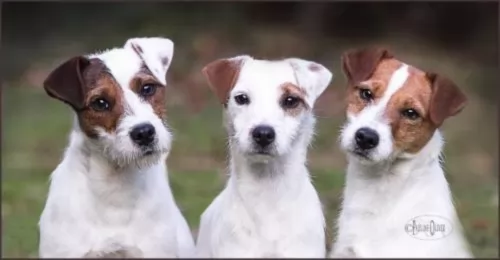 The Parson Russell Terrier has different coat types – the smooth and rough and both will require regular brushing. Rough coats will require plucking or clipping to avoid matting.
The Parson Russell Terrier has different coat types – the smooth and rough and both will require regular brushing. Rough coats will require plucking or clipping to avoid matting.
Check his eyes and ears regularly. Look inside his ears for excess wax and dirt which could lead to an ear infection. His nails should also be trimmed.
The best thing you can do for your Parson Russell Terrier if you don’t want your pet producing puppies is to have it spayed or neutered. Spaying for females or neutering for males decreases the likelihood of certain types of cancers too so it can be beneficial.
Diet is hugely important for a Parson Russell Terrier and the food you decide for him can impact his health. Many time those ‘treats’ you feed your pet do nothing more but give him a stomach ache.
It's tempting to pop chocolates, popcorn, nuts and ice cream into your pets mouth when he is so adorable but in the long run it is shortening his life. All he basically requires and needs is a simple, consistent diet of the top commercially manufactured foods mixed with some tasty home made food from time to time.
Boiled chicken, brown rice and vegetables such as sweet potatoes, carrots and spinach will do your pet wonders. Ensure he always has fresh, cool water available to him.